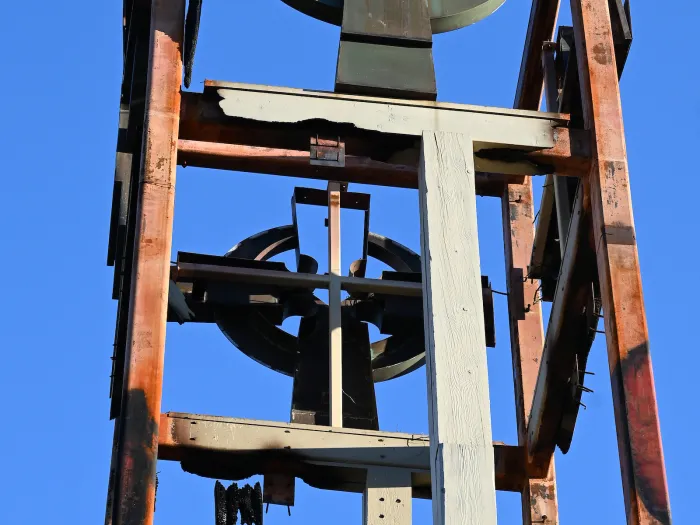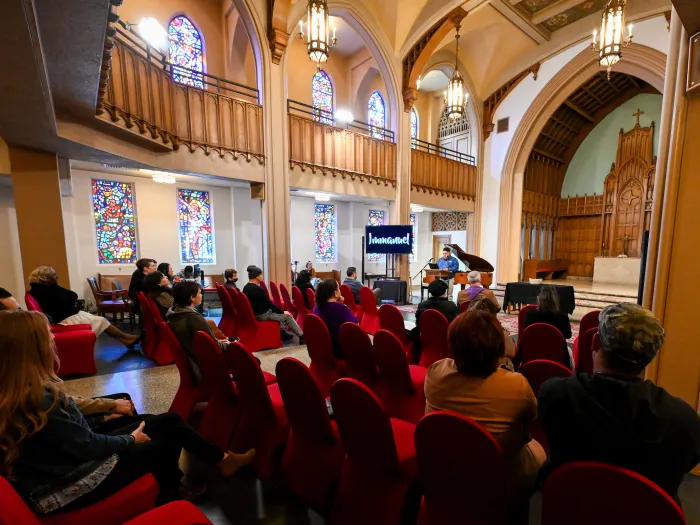Pasadena pastor reassures California residents it’s OK to lament
Presbyterian church strives to be supportive and meet the needs of the displaced


“By the rivers of Babylon — there we sat down, and there we wept when we remembered Zion.”
LOUISVILLE — With those opening words from Psalm 137, the Rev. Dr. Lisa Hansen took the congregation of Pasadena Presbyterian Church back to a moment when people from ancient times felt the kind of anguish and heartbreak that many in her community have experienced since unprecedented wildfires began tearing through parts of the Los Angeles area.
In the ancient account, exiles from Israel are being told by their captors to sing songs of Zion, but “How could we sing the Lord’s song in a foreign land?” the captive wonders. “If I forget you, O Jerusalem, let my right hand wither! Let my tongue cling to the roof of my mouth, if I do not remember you, if I do not set Jerusalem above my highest joy.” (Psalm 137:4-6)
Hansen, the church’s senior pastor, was using the psalm to reassure listeners that it’s OK to lament in this time of tragedy when some people have been left with little more than what they could grab at a moment’s notice. Those in worship included members of the Pasadena congregation as well as some visitors who’d been displaced by the wildfires.
“It's important for people to understand that you're allowed (to mourn), God wants you to lament,” Hansen explained in an interview. “God wants you to feel your pain and to share your pain with others, and the laments in the psalms really help us to get to that place and then realize what it is we need to do and how we need to be.”
Hansen delivered her sermon Jan. 12, the first Sunday after an outbreak of fires, fueled by high winds, blazed through populated areas such as the Pacific Palisades, damaging thousands of structures and killing at least two dozen people. (Some fires are still burning, but firefighters are making progress.)
Before the tragedy, residents were focused mostly on routine things like watching ballgames and taking down Christmas decorations, Hansen noted in her sermon.
But “on Tuesday, (Jan. 7) our lives changed dramatically, more for some than for others,” she said. “The fires that erupted and led to catastrophic destruction altered the course of all of our lives.”
Similarly, in the biblical account, the exiles were dealing with a situation in which everything had been taken away from them, Hansen said. “Their homes were gone, their place of worship was gone, their livelihood was gone,” and yet their captors were telling them to snap out of it and sing.
“That's what we hear over and over again: ‘Just be grateful for what you have; don't worry about things; it will all be OK,’” Hansen said. “But the singers and the dancers and the people sat down and they wept as they remembered their homes and what they had lost.”
Just like in ancient times, “now is the time to weep,” Hansen said. “It’s OK to want things to be the way they were before.”
But take heart in knowing that “our shared grief gives us strength” and “God provides comfort and assurance to those who trust in God, especially those who are hurting.”
Hansen cited Isaiah 43, which says in verses 2-3, “When you pass through the waters, I will be with you, and through the rivers, they shall not overwhelm you; when you walk through fire you shall not be burned, and the flame shall not consume you. For I am the Lord your God, the Holy One of Israel, your Savior.”
That and other biblical texts provide assurance that we are precious to God, who promises to be with us, even in the most difficult of times, Hansen said.
Hansen, who served as a chaplain in the U.S. Air Force, also called on the congregation to be supportive of people affected by the wildfires and noted that information would be sent out about how to help.
“The need is great, but the church of Jesus Christ is many. We are called to support those who are devastated and we are called to support one another who are weeping,” she said.
Acknowledging those who have reached out from great distances, Hansen said, “As we supported those who were devastated by the hurricanes and floods on the East Coast, they are now reaching out to support us. As we supported people who were dealing with disasters in far-off lands, people from other countries are coming to help us. They care because Jesus has taught us and showed us a way to care, and God has promised to always be with us.”
The sermon took place on Baptism of the Lord Sunday, and Hansen took the opportunity to emphasize that that through baptism, members are connected not only to God, but to one another.
“It's a community of believers who are connected through Jesus to each other in such a way that we take care of each other,” Hansen said. “But we also take care of those whom Jesus loved the most: the poor, the stranger, the dispossessed and the traumatized.”
She closed with words of encouragement from Paul’s Letter to the Romans, which says in part: “Let love be genuine; hate what is evil; hold fast to what is good; love one another with mutual affection; outdo one another in showing honor. Do not lag in zeal; be ardent in spirit; serve the Lord. Rejoice in hope; be patient in affliction; persevere in prayer. Contribute to the needs of the saints; pursue hospitality to strangers. Bless those who persecute you; bless and do not curse them. Rejoice with those who rejoice; weep with those who weep.”
In addition to offering words of encouragement, Pasadena Presbyterian Church is taking several steps to help those affected by the fires to recover. Those efforts include establishing support groups to address mental health needs, offering gathering space to displaced houses of worship, and negotiating with an organization to become a place for the preparation of hot meals.
About seven members of the church lost their homes as a result of the wildfires, so the church has a keen interest in assisting those in need.
“We're collecting funds, and we're using our own funds to provide immediate relief, particularly to our church members,” as well as others in the presbytery, “to allow them to purchase the things they need at this point in time, rather than force things on them,” Hansen said. “So, we'll be giving people some financial support and help in the short term, and then whatever they need in the long term.”
They’re also thinking of ways to help people whose jobs have been affected. For example, Pasadena Presbyterian Church has reached out to affected churches “and said if you have staff members who need to work, we can certainly find work for them in our facility and make sure that we pay them for their time. So we're going to increase our staff until people have a place to work and feel safe in their environment.”
The efforts are all ways to emphasize that “you're not on your own with God,” Hansen said. “It’s you and the community. The heart and (the) hands of God are the community that supports you and cares for you.”
Watch Hansen’s sermon here. It begins around the 19:06 mark.
Financial support for relief efforts through Presbyterian Disaster Assistance can be designated to DR000165, which supports the church’s response to wildfires in the U.S. Gifts can be made here.
You may freely reuse and distribute this article in its entirety for non-commercial purposes in any medium. Please include author attribution, photography credits, and a link to the original article. This work is licensed under a Creative Commons Attribution-NonCommercial-NoDeratives 4.0 International License.




